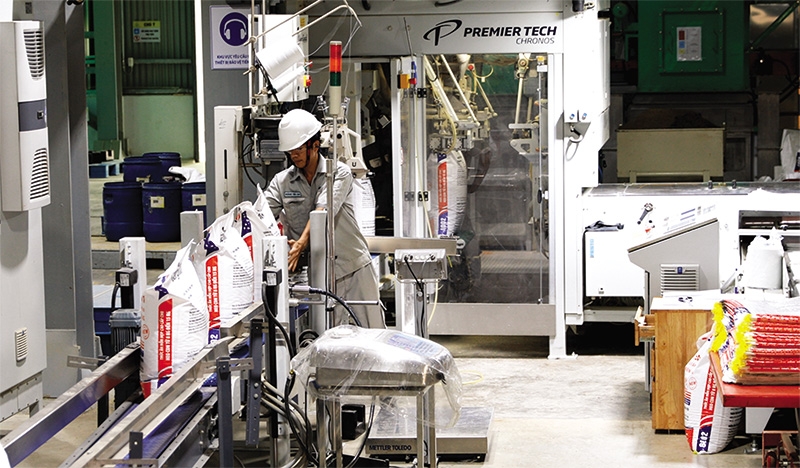Cargill helping Vietnam thrive
 |
| Cargill’s animal feed being produced in Binh Duong province |
Cargill is known as one of the first American companies that established business in Vietnam after the normalisation of diplomatic relations in 1995. What are the highlights for Cargill in Vietnam after these 24 years?
 |
| Nguyen Ba Luan |
Cargill is a global company connecting farmers with markets, customers with ingredients, and people and animals with the food they need to thrive. Operating in Vietnam since 1995, Cargill today owns and operates 12 animal nutrition plants, two grain and oilseed warehouses, and two aqua technology application centres. Our operations include animal nutrition, animal protein, food and beverage ingredients, agriculture supply chain, and metals. We employ almost 1,600 employees nationwide with up to 99 per cent being Vietnamese people.
In addition, through diverse community enrichment initiatives, Cargill’s businesses and employees are actively engaged in giving back to the local communities, and this has become a major goal for us here.
One of Cargill Vietnam’s current community-oriented activities is to build schools for children. Can you tell us more?
With a strong belief that people’s lives can be improved through education, Cargill’s school-building programme for Vietnam started in 1997 to create a safe and conductive education infrastructure for rural communities across the country. Ninety such schools in 47 provinces have been built by Cargill Cares, an employee-led volunteering initiative. A typical school consists of four or five classrooms, a schoolyard, and restroom facilities. Each school serves about 150 to 250 students.
Funds come from Cargill customers, partners, and employees as well as a matching fund from Cargill that doubles the financial resources. Cargill’s employee volunteers have been engaged in the entire process from fundraising and site selection to construction management, facility hand-over, and follow-up inspection.
As of March this year, we built 90 schools in Vietnam, benefitting over 14,500 Vietnamese children annually, but our goal is to build 100 such schools here by 2020. To do that, we are now open to raising funds from enterprises and individuals to realise 10 more school projects for the country.
We will continue to make investments in Vietnam in a number of ways, all aimed at growing our business, and serving our customers and Vietnamese people. We will do that through funding facilities, talent, and the communities in which we operate in the many years to come.
How important is the concept of corporate social responsibility (CSR) to Cargill Vietnam?
Cargill is proud of our overall record in investing in communities. It is part of our value set of how we operate our business. We’re honoured to serve Vietnam via building schools and training farmers as we believe we can help farmers, and their children have better lives through education. CSR has become an integral part of our culture and our commitment to Vietnam, and is a common mindset among our employees that we can only have sustainable growth by giving back.
Agriculture is obviously considered one of Vietnam’s most important economic sectors. What do you think about the potential and challenges to Vietnamese farming and to Cargill?
Agriculture is among the biggest sources of revenue for Vietnam and it continues to have important potential, regardless of the market swings in supply and demand.
That is why it is important for us to listen to our customers and help them succeed. The animal feed industry, for example, is highly fragmented with over two million farming households. Many of them do not have access to information, technology, capital, and know-how.
With the limited extension systems for farmers, we have to place emphasis on training our farmers and providing the resources and knowledge to service them.
We invest in helping farmers become more efficient, more productive, and to help grow their business. This in turn allows us to grow together with them.
What the stars mean:
★ Poor ★ ★ Promising ★★★ Good ★★★★ Very good ★★★★★ Exceptional
 Tag:
Tag:
Related Contents
Latest News
More News
- Masan Consumer names new deputy CEO to drive foods and beverages growth (February 23, 2026 | 20:52)
- Myriad risks ahead, but ones Vietnam can confront (February 20, 2026 | 15:02)
- Vietnam making the leap into AI and semiconductors (February 20, 2026 | 09:37)
- Funding must be activated for semiconductor success (February 20, 2026 | 09:20)
- Resilience as new benchmark for smarter infrastructure (February 19, 2026 | 20:35)
- A golden time to shine within ASEAN (February 19, 2026 | 20:22)
- Vietnam’s pivotal year for advancing sustainability (February 19, 2026 | 08:44)
- Strengthening the core role of industry and trade (February 19, 2026 | 08:35)
- Future orientations for healthcare improvements (February 19, 2026 | 08:29)
- Infrastructure orientations suitable for a new chapter (February 19, 2026 | 08:15)






















 Mobile Version
Mobile Version